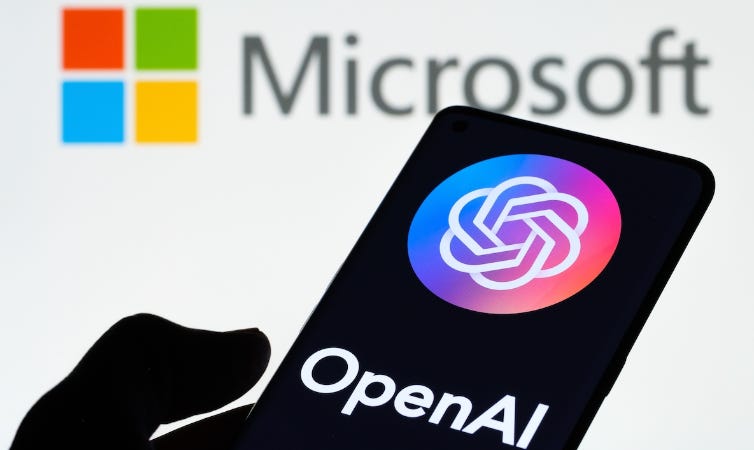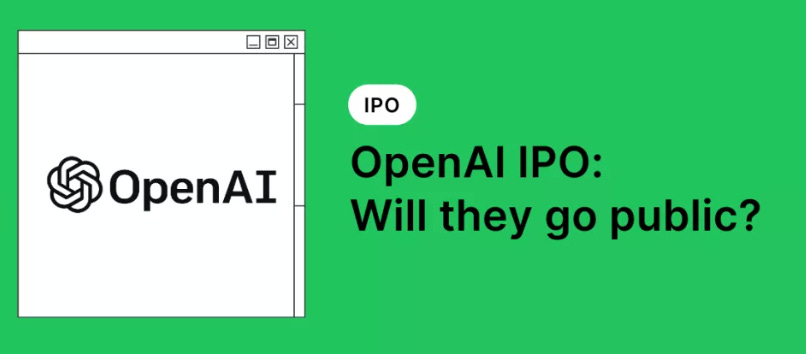- Yaro on AI and Tech Trends
- Posts
- ⚖️ Is Our Data Worth the Power of AI?
⚖️ Is Our Data Worth the Power of AI?
Plus: Will OpenAI go Public?
Get in Front of 50k Tech Leaders: Grow With Us
Greetings Everyone,
Hope you had a good weekend. As we start this week we hear from OpenAI potential IPO, we also share how Microsoft and OpenAI are coexisting as rivals and collaborators and the perils of giving up our data to tech behemoths. Lets go in.
📰 News and Trends.
Is Our Data Worth the Power of AI?
Microsoft and OpenAI are Collaborators and Rivals.
🧰 AI Tools of The Day (Logo Design)
Will OpenAI go Public?
📰 AI News and Trends
Meta halts plans to train AI on Facebook, Instagram posts in EU (Ars)
NVIDIA Releases Open Synthetic Data Generation Pipeline for Training Large Language Models (Nvidia)
To control their artificial-intelligence destinies amid U.S., China dominance, countries are building their own computing infrastructure (WSJ)
Months before the U.S. presidential election, some AI chatbots and voice assistants offer potentially harmful misinformation (WP)
🌐 Other Tech news
Too much of a good thing? Spain's green energy can exceed demand (BBC)
The United States and China appear locked in a race to weaponize four-legged robots for military applications (Wired)
Walmart launches a clothing lie to compete to Shein (BOF)
Americans trust TikTok more than other social apps for news content, despite the political turmoil around it (BI)
Apple’s supplier “TDK” has developed a new material for its small solid-state batteries, promising enhanced performance for devices like wireless headphones and smartwatches (FT)
Spot Ethereum ETFs may begin trading by July 2 (CT)
Ukraine has a navy that needs no sailors (TheEconomist)
Is Our Data Worth the Power of AI?

Allowing AI platforms and tech companies to use our data can have several potential harms, including:
1. Privacy Loss: The most direct impact is the erosion of personal privacy. Sensitive information such as location (which sometimes are embedded in this programs), browsing habits, financial details, and even health data can be exposed to unauthorized parties or misused.
2. Security Risks: Data breaches are a significant risk. If a company fails to adequately protect user data, it can be stolen by hackers, leading to identity theft, financial loss, and other personal damages. Most of this data ends up for sale in the dark web.
3. Manipulation: Data can be used to manipulate users’ choices and opinions. For example, personalized advertising can be designed to exploit vulnerabilities or biases, elections, impacting users' purchasing decisions or personal views.
4. Discrimination: Algorithms that process personal data for decisions like hiring, lending, and insurance might develop biases, leading to unfair treatment based on race, gender, or other personal characteristics.
5. Surveillance: Continuous data collection can lead to a form of surveillance, where every action online (and sometimes offline) is tracked and recorded, leading to a chilling effect on freedom of expression and thought. Our devices can hear, talk, see, feel, and soon will smell. They also record using all of the above.
6. Dependency and Control: Over-reliance on personalized technology can lead users to lose autonomy in decision-making, with algorithms determining what information they see or which choices are most prominent, sometimes according to their location.
7. Economic Disadvantages: The economic value generated from user data primarily benefits the companies that collect it, often without fair compensation to the individuals whose data is being used.
These harms points the need for robust data protection laws, transparent practices from companies, and greater user control over personal information. I would like to hear your opinion on this and other ways that giving up our data can be harmful.
Microsoft and OpenAI are Collaborators and Rivals.
Microsoft’s AI Chief Dives into OpenAI’s Code.

Microsoft's AI chief, Mustafa Suleyman, is now examining OpenAI's key algorithms, marking a unique competitive dynamic between Microsoft and OpenAI, despite their partnership.
Suleyman's move from Google’s DeepMind to Microsoft, and his access to OpenAI's technologies through Microsoft's investment, has intensified the competitive atmosphere within these collaborations. While both companies benefit from this partnership, the possibility of future separation could shift the competitive landscape, especially as Microsoft explores developing its own AI technologies. Both companies maintain a symbiotic relationship, but the evolving nature of AI could challenge this harmony.
🧰 AI Tools Of The Day.
Logo Design.
Looka - AI-powered platform to design a logo and your brand.
Namecheap Logo Maker - Simply answer a handful of questions and get hundreds of logos to download for free.
Logo AI - Make lgoso that fit your style and brand.
Designs AI - Create logos, videos, banners, mockups with A.I. in 2 minutes.
Brandmark - Free AI-powered design tools to get color and font ideas for your next logo project.
Download over 500+ Tools free here.
Will OpenAI go Public?

There are reports that OpenAI is considering becoming a for-profit company. This could be done as a benefit corporation, which would require them to balance profit with social good.
If they become for-profit, it opens the door to an IPO (selling shares to the public) which could raise a lot of money, but might also make them less likely to offer free services.
OpenAI's current valuation is around $80 billion, based on a recent deal led by Thrive Capital. If OpenAI were to go public and be traded on the stock exchange, its valuation could potentially be much higher, given the recent surge in valuations of other major tech companies involved in AI development. For example:
Nvidia's valuation has gained around $700 billion since the AI boom kickstarted by OpenAI's ChatGPT.
Apple's valuation has gone up by around $300 billion.
Meta's valuation has increased by around $300 billion.
Google's valuation has risen by around $500 billion.
OpenAI says their non-profit mission is still important, and they may follow a model similar to Mozilla's with separate for-profit and non-profit arms. There is some concern that becoming for-profit could change OpenAI's goals from what some people originally envisioned.
Newsletter Recommendation:
Growth Forum - Learn how to build a repeatable sales process creating a pipeline full of qualified deals.
Secrets of Success - Learn Mental Models for success.
Reply